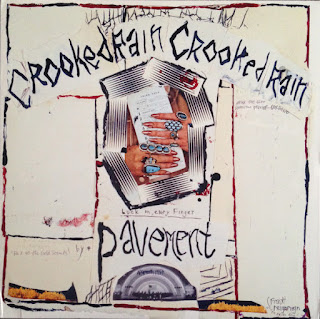Cabaret Voltaire - Hai! (Album Review)
Cabaret Voltaire - Hai!
(1982)
My copy: 1982 press by Rough Trade.
Hai! Is a live recording of a Cabaret Voltaire show in Tokyo, Japan. Having existed for nearly ten years at the point of this live album’s recording, the band’s sound had evolved from more overt dada inspired industrial nightmares into a slightly matured fusion of electronic funk with synthesized noise improvisation. Having added a live drummer in Alan Fish, Hai! benefits from this new focus on stable percussive rhythms.
The set opens with a looped electronic beat on “Walls Of Kyoto” where a myriad of synth tones buzz about with fervor over chorus-soaked bass and guitar. Pioneers to alternative electronic music that they are, it makes sense that Cabaret Voltaire would lend their skills to aid the then burgeoning combination of goth and synthesizer genres. The sound is less outwardly industrial and more akin to an ethereal fever dream - thanks largely to Stephen Mallinder’s ravenous vocal cries. The track picks up steam as the programmed beat turns to double-time hi-hats though much of the album holds steady at similar tempos. “3 Days Monk” switches over to live drumming, now with a funk-inspired bass tone and the late Richard Kirk’s screeching saxophone. The stilted rhythm and sharp, twisted melodies evoke an NYC no-wave comparison, though the grooves are not nearly as tight. Cabaret Voltaire makes up for the simple rhythms by way of greater experience with sound manipulation, continuously peeling back curtains of otherworldly melodies.
“Yashar (Version)” is a prickly juxtaposition between digital found sounds and primal percussive rhythms. The drums focus almost solely on the toms, with the bass generating an ominous groan by running something (likely metallic) down the length of its strings. Even in the tribal march of the rhythm, a bright synth slips through eastern scales while the vocals reduce to distinct chants. A sample of speaking is turned robotic by effects on “Over & Over” which is the supreme example of intense repetition on the record. “Diskono” fittingly takes on a disco beat after a fantastical mesh of synth kites about. By this point in the set the band has settled into a more comfortable brand of off-kilter psychedelia with relatively relaxed landscapes of noise.
The final track, “Taxi Music (Version)” is the longest track, executing a curious mix of afro-beat and industrial music. The percussion is not left to just its galloping digital beat, but opens to a wider array of hand drums amongst other pops and clicks. The saxophone returns and a repeated whistle-like melody serves as a motif, seemingly tributing Brazilian street music or perhaps borrowing further from afro-beat. The vocals are now largely subdued mutterings capped off by mad shouts, though the mood is not nearly as visceral as earlier in the album.
This performance shows just how capable and creative Cabaret Voltaire were as live musicians, keeping crowds engaged with repeated, primitive rhythms that serve as a wowing contrast to the sweeping synth compositions that dance overhead. In their early days, Cabaret Voltaire performed their interpretation of dadaist music wherein they were often booed off stage and even assaulted with thrown objects (see Mallinder’s hospitalization in ‘75), but here in ‘83 they perform to avid appreciation. Forever ahead of their time creatively, they only lacked a broader sense of fundamentals here.




Comments
Post a Comment